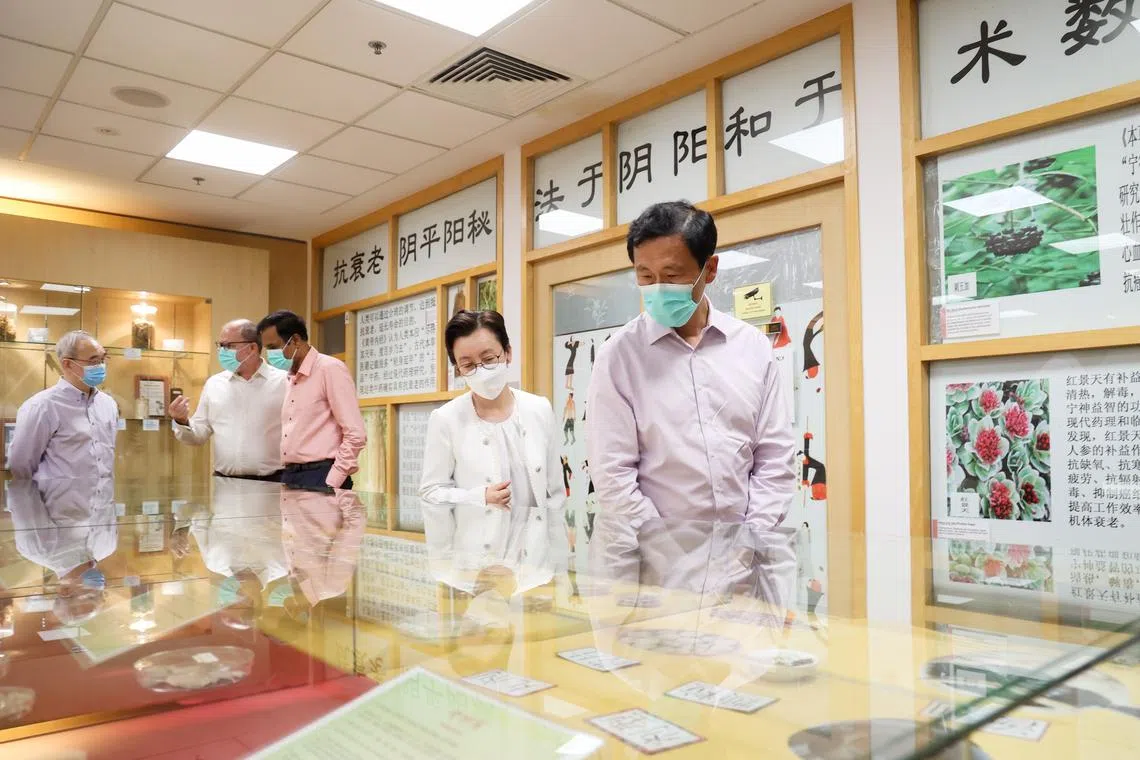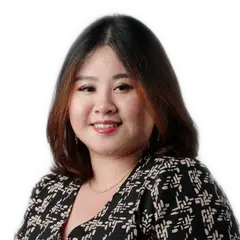NTU to offer new TCM degree programme in August 2024
Sign up now: Get ST's newsletters delivered to your inbox

Health Minister Ong Ye Kung touring the NTU Chinese Medicine Clinic on Nov 15.
PHOTO: LIANHE ZAOBAO
SINGAPORE – A new degree programme will be offered by Nanyang Technological University (NTU) to strengthen the foundations of traditional Chinese medicine (TCM) education in Singapore, gearing practitioners to tackle healthcare needs specific to the population here.
The four-year Bachelor of Chinese Medicine offering is the first locally conferred undergraduate degree programme accredited by the Ministry of Health’s (MOH) Traditional Chinese Medicine Practitioners Board.
It will be offered by NTU’s School of Biological Sciences, and will enrol its first class of 25 students in August 2024, with plans to go up to 40 eventually.
It replaces a double-degree programme currently offered by NTU in biomedical sciences and Chinese medicine with Beijing University of Chinese Medicine, which began in 2005. The last cohort will graduate in 2028.
The new programme was launched by Health Minister Ong Ye Kung at NTU’s School of Biological Sciences on Wednesday, where he was also given a tour of the NTU Chinese Medicine Clinic.
In his speech, he said more than 430 students graduated from the double-degree programme, with an average of 30 students a year.
“Although designed as a double-degree programme, the career preference of graduates was clear. More than 80 per cent went on to obtain their licence as registered TCM practitioners. The majority continues to be working in TCM or TCM-related sectors years after graduation,” noted Mr Ong.
A review by MOH, the Ministry of Education and NTU concluded that the time was ripe for the university to offer its own TCM degree suited to Singapore’s healthcare needs.
Professor Kanaga Sabapathy, chair of NTU’s School of Biological Sciences, said the double-degree programme gave students exposure to Chinese patients, as they would go to Beijing as part of the curriculum.
But the population in Singapore is less homogenous and includes other communities like Malays and Indians, which the new degree programme will cater to.
“We will primarily look at whether we can prevent diseases by taking a longer-term approach, particularly in terms of issues like diabetes, mental health and infertility,” he added.
The curriculum will include modules in physiology, pharmacology and anatomy, and offer classroom as well as clinical training.
Requirements to qualify to practise in Singapore, such as the need to fulfil more than 400 hours of internship locally, will be integrated into the curriculum.
Students will intern at partner TCM institutions every semester, and may also have opportunities for overseas exchanges to see how TCM is practised worldwide.
TCM has played a complementary role in Singapore’s healthcare system. For example, public hospitals offer TCM acupuncture alongside mainstream Western medicine treatment which is subsidised and can be paid for using MediSave.
The School of Biological Sciences also plans to work with NTU’s Lee Kong Chian School of Medicine (LKCMedicine) to offer a curriculum that integrates modern science with an ancient discipline.
Professor Joseph Sung, NTU’s senior vice-president of health and life sciences and dean of LKCMedicine, said: “Integrating contemporary medical science into TCM education and emphasising the importance of clinical research could be one way to help the younger generation better appreciate TCM in the context of modern science and medicine.”
With the new degree programme, NTU is also looking to set up an interdisciplinary research centre in Chinese medicine. Aside from proving the efficacy and safety of TCM treatments, another goal is to look at interdisciplinary research areas such as how artificial intelligence and biomedical engineering can be used in TCM diagnosis, which relies on traditional methods such as pulse monitoring.
At the event, Mr Ong also announced a new programme for newly accredited TCM practitioners to gain more experience.
“One key concern is that new TCM practitioners often lack confidence at the early stage of their career, when they have to transit to independent clinical practice. Unlike western doctors, there is no structured system of housemanship and residency training,” he noted.
MOH will roll out the TCM Clinical Training Programme (CTP) in January 2024 for newly registered practitioners who have passed their TCM licensing examinations in 2023.
“This is a full-time one-year structured clinical training programme, similar to the post-graduate year one housemanship for medical students,” said Mr Ong.
Selected TCM practitioners will undergo three-month clinical rotations at four TCM institutions. These are the NTU Chinese Medicine Clinic, Public Free Clinic Society, Singapore Chung Hwa Medical Institution and Singapore Thong Chai Medical Institution.
“We hope that through the CTP, these new TCM practitioners will be able to strengthen their clinical capabilities and confidence to ready themselves for independent practice,” said Mr Ong.



